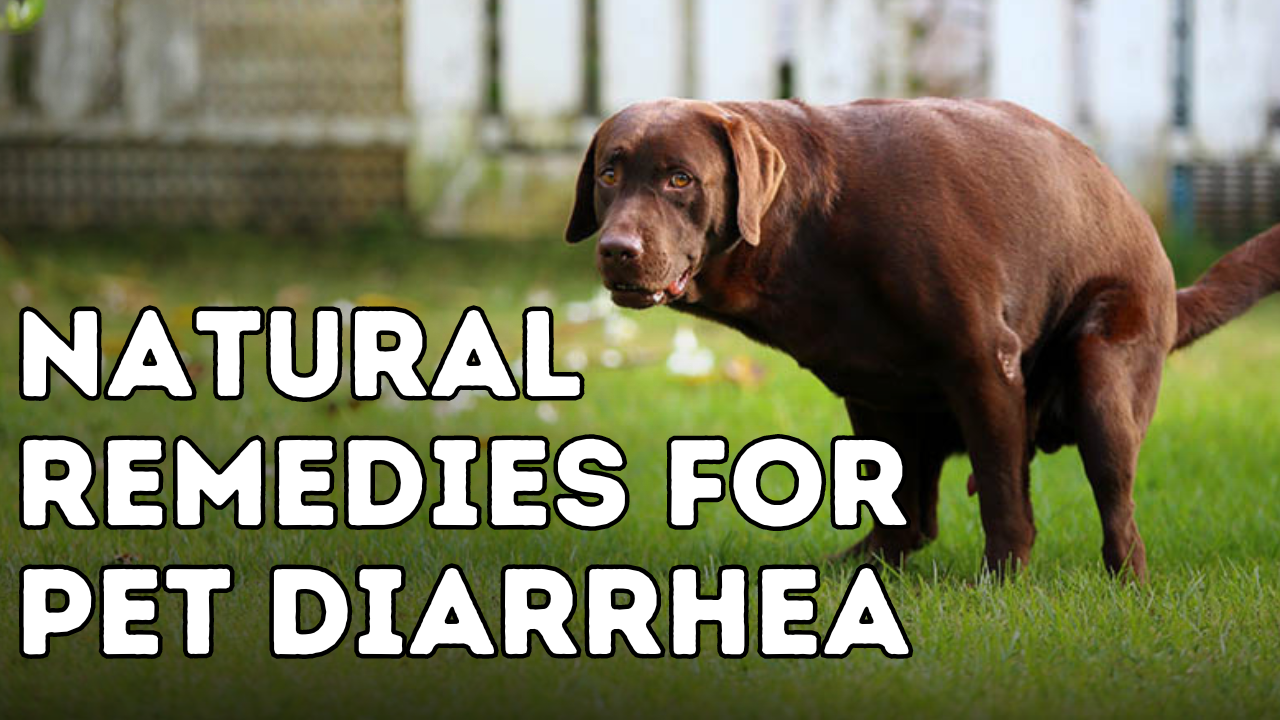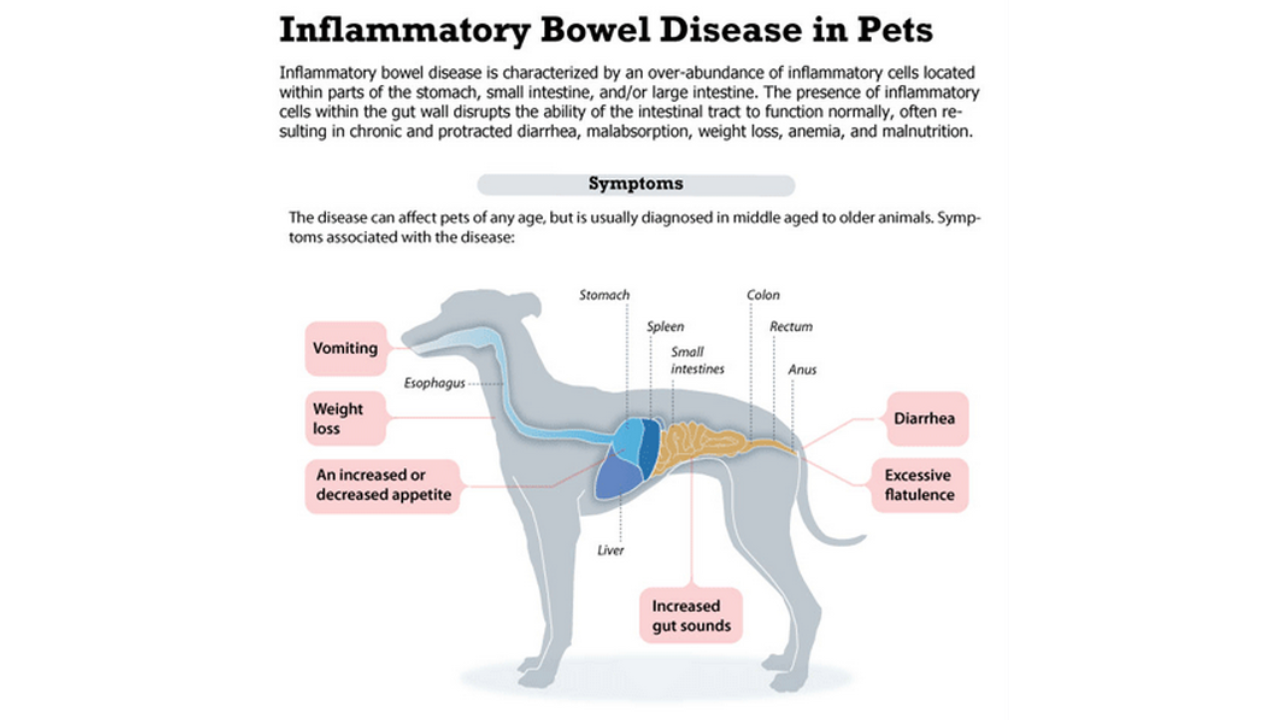Struggling with Pet Diarrhea? Here’s How Natural Remedies Can Help

Chronic vomiting, diarrhea, upset/painful stomach, acid reflux: these are some of the signs of inflammatory bowel disease (IBD), which is way to common in our dogs and cats.
What CAN you do?
Well as an alternative option, you should consider trying our NEW Digestive Enzyme Supplement: Dr Jones’ COMPLETE Digestive Care Soft Chews


Inflammatory Bowel Disease (IBD) in Dogs and Cats
Understanding Inflammatory Bowel Disease (IBD)
Inflammatory Bowel Disease (IBD) is an inflammatory condition affecting the intestines, with an unknown cause. It is suspected that hypersensitivities to food or bacterial antigens play a role in its development, while other factors like overstimulation of the immune system by vaccines and other antigens are also potential contributors. Clinical signs of IBD in pets include chronic vomiting, diarrhea, and weight loss.
IBD is better understood as a syndrome rather than a disease, caused by a specific reaction to ongoing irritation of the intestinal tract. Regardless of the exact cause, the result is the invasion of the intestine by inflammatory cells, leading to an allergic-type response. This inflammation interferes with nutrient digestion and absorption, leading to chronic gastrointestinal issues. Most pets with IBD have a history of recurring or chronic vomiting, diarrhea, and often a poor appetite.
What Are the Clinical Signs of IBD?
IBD can affect different parts of the gastrointestinal (GI) tract but most commonly involves the stomach and/or intestines. If the stomach is affected, your pet will experience chronic vomiting. When the intestines are involved, chronic diarrhea occurs. In some cases, both the stomach and intestines are affected, resulting in both vomiting and diarrhea.
If left untreated for several months, poor appetite and weight loss are common consequences. Interestingly, some pets develop a voracious appetite to compensate for their inability to properly digest and absorb the nutrients from their food.
IBD Treatment Options
1. Dietary Therapy
Using a novel protein or hydrolyzed protein diet can help manage IBD. This kind of diet is formulated to avoid potential allergens that could trigger an inflammatory response in your pet’s GI tract.
2. Probiotics
Probiotics can be beneficial in managing IBD. I recommend supplements such as ULTIMATE Canine/Feline or Digestive Care Soft Chews, which contain high-quality probiotics. These supplements help restore balance to the gut microbiome, supporting your pet’s digestion and immune health.
3. Anti-Diarrheal Medication
For short-term relief of diarrhea, anti-diarrheal medications like loperamide (Imodium) can be used. A typical dose is 1mg per 20lbs of body weight, given twice daily for three days.
4. Natural Immunosuppressants
Cannabidiol (CBD) has shown promising results as a natural immunosuppressant. I recommend a dose of 3mg per 10lbs, given twice daily. CBD can help reduce inflammation and alleviate symptoms associated with IBD.
5. Licorice Root
Licorice root is an effective short-term natural remedy for reducing inflammation. It acts as a natural steroid alternative and can be given at a dose of 1/4 ml per 10lbs twice daily for up to 10 days.
Slippery Elm: A Soothing Herbal Treatment
Slippery Elm, prepared from the inner bark of the Slippery or Red Elm tree (Ulmus rubra), is a well-known herbal remedy for pets with gastrointestinal issues. The term “slippery" refers to the viscid gel formed when the powdered bark comes into contact with water. This herb acts as a protectant and lubricant for the digestive tract.
The tannins present in Slippery Elm help reduce inflammation, while the mucilage components provide lubrication to the digestive tract and aid in waste elimination.
Dosage:
- 1/8 to 1/4 teaspoon of organic or wild-crafted Slippery Elm bark powder once or twice daily.
- Alternatively, one 350-400mg capsule can be given daily.
95% Curcumin for IBD Relief
A new study has confirmed that BCM-95® (Dr. Jones’ 95% Curcumin), a high-potency turmeric extract, is more effective than standard curcumin in reducing the disease activity and inflammatory burden associated with colitis. This makes it an excellent option for pets suffering from IBD, providing natural anti-inflammatory benefits.
Digestive Enzymes for Improved Digestion
While there is limited research on the use of digestive enzymes in IBD, many pet owners report significant improvements in their pets’ health, including reduced intestinal distress, vomiting, and diarrhea. It is crucial to use a quality enzyme supplement that includes amylase, lipase, and protease. My product, Dr. Jones’ COMPLETE Digestive Care Soft Chews, contains these enzymes and may help improve your pet’s digestion.
Heal Your Pet at Home!
Inflammatory Bowel Disease can be frustrating to manage, but there are natural options that can significantly improve your pet’s quality of life. Supplements like Slippery Elm and Digestive Enzymes can offer relief and help your pet on the path to better health.
Dr. Jones’ COMPLETE Digestive Care Soft Chews

P.S.
Our new supplement, Dr. Jones’ Complete Digestive Care Soft Chews, is a tasty and beneficial treat that your pet will love! These chews contain a proprietary Digestive Enzyme Blend and 2 Billion CFUs of beneficial Probiotics. They can help dogs and cats with issues related to poor nutrient absorption, such as food allergies, sensitivities, pancreatitis, Exocrine Pancreatic Insufficiency (EPI), and Inflammatory Bowel Disease.
Dr. Jones’ COMPLETE Digestive Care Soft Chews


I just love your videos and they have helped me tremendously with my dog. He is a 90lb corgi!! He is aggressive with certain people and kids so basically we are home bound most of the time. He has a problem with his Pooh. He can get it off his butt when he goes. Some of it but not all and it is so hard trying to get him to take it off. HELP!! What do I do?????
A supplement that can surely help with gut problems is our Probiotic Formula and the one mentioned above, The Digestive Care:
https://shop.veterinarysecrets.com/supplements/ultimate-probiotic-formula.html
https://shop.veterinarysecrets.com/supplements/digestive-care-soft-chews.html
hello,
I have a 15 yr old cat with SEVERE diarrhea for 6 months. It is to the point that as soon as he eats anything he goes straight to the litter box and has explosive diarrhea that is so putrid. I already consulted with a holistic veterinary that cost me $500. She prescribed chinese liquid herbs which he will NOT take. He will not take any liquids or powders in his food. I am leaning toward buying your enzyme chews to see if it will help. Any suggestions on what I can give him in a pill form? Thank you, Judy
Hi Judy, if you search for IBD you may find something that can help:
https://veterinarysecrets.com/?s=IBD
The digestive enzyme chews may help, as digestive enzymes have been suggested for the issue, and as it’s a chew it may be easier to get your cat to accept it.
https://shop.veterinarysecrets.com/supplements/digestive-care-soft-chews.html